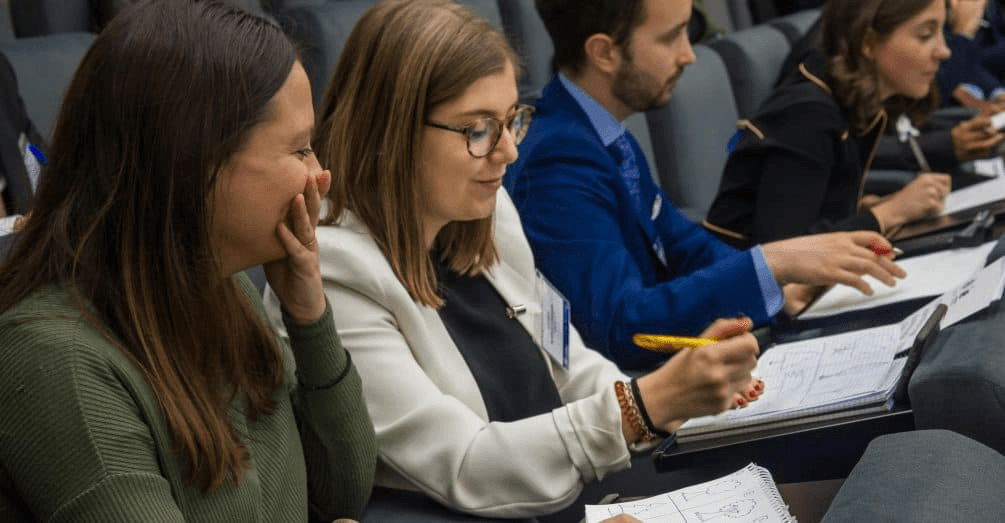- Home
- We Are Law School
- News
- 10 Skills You Will Need To Thrive In Tomorrow´s Legal Job Market
10 skills you will need to thrive in tomorrow´s legal job market

The world of work is changing – and some jobs are changing faster than others. According to the latest research, and top experts, the following skills will be key in order to succeed in your future career. How can we make sure we keep pace?
The International Bar Association (IBA) has collaborated with IE Law School in order to discuss the challenges and changes the future lawyer might face. Soledad Atienza, Vice Dean for International Relations, Director of the Bachelor of Laws at IE Law School and member of the IBA Academic and Professional Development Committee Advisory Board, led the discussion. The panel focused on developing leadership and management skills for lawyers, where the top 10 skills demanded in 2020, according to a study by the World Economic Forum (the Future of Jobs), were discussed. The panel was composed of Marisa Méndez (consultant on professional services management for law firms and legal networks), Carlos Pallero (Founder & Director of Mente Colectiva) and Lloyd Stephenson (Global Head of Resourcing, HR, Ashurst, London), who jointly discussed the skills needed by future lawyers.
The conference started with a Kahoot poll on the thoughts of the audience on which skills were more relevant and how the influence of technology in a lawyer’s job (according to a study by McKinsey, a robot can replace only 23% of a lawyer’s job). After sharing some insightful data, experts deconstructed the top ten skills that will be demanded in 2020:
1- Complex problem solving
Historically, lawyers have focused on obtaining the perfect answer or solution, but currently, the challenge is that solutions are becoming more iterative, and they become a process that lawyers must do with their clients. The approach has changed, and thus it is relevant for them to keep asking the question “Why?” to reach a better solution.
2- Critical thinking
For lawyers, it is necessary to develop a critical thinking mindset and have excellent oral and writing skills. At IE, this mindset is built through the study of humanities. To be a critical thinker, it is necessary to brainstorm and explore different options through divergent thinking, so you can find the best alternative through convergent thinking.
3- Creativity
Creativity is a skill that can be trained and fostered. For a proper creative process, there has to be a dreamer, which thinks of endless possibilities, a realist, who defines which possibilities are feasible, and a spoiler, which criticizes those options to implement them in the best possible way.
These first three skills are the heart of the legal profession; these are what makes the difference between the tasks of the profession, which may be done by robots, and those that cannot.
4- People management
This point determines how a person is able to manage relationships with others, delegate and collaborate. At companies, it is becoming more common to test candidates for leadership potential.
5- Coordinating with others
Collaboration at companies is essential. As cross-selling, cross collaborating is a valuable skill lawyers will need; they have to be able to work with others in order to obtain the best results for their clients and face increasing complexity.
6- Emotional intelligence
This skill is about reading and understanding the people around you, as well as learning how to handle your emotions – emotions are not there to be controlled but managed. By learning how to deal with each emotion successfully, it is possible to maintain high energy levels and productivity.
7- Judgement & decision making
Lawyers should have traits that complement each other in order to make decisions. The most observed ones are optimism (pessimism), collaboration (individualism), time management (high sense of urgency) and empathy (low sociability). By finding a balance between these traits, it is possible to develop good judgment and decision-making skills.
8- Service orientation
An orientation towards service is needed in order to solve a client’s problems successfully – by having the intent and solving their issues, lawyers are able to be successful.
9- Negotiation
Negotiation is a skill that can be trained – through a combination of emotional intelligence and learning how to treat others. In addition, by knowing their limits, lawyers are able to successfully negotiate to find an equilibrium between the needs of both parties.
10- Cognitive flexibility
This is the ability to learn how to create or complete tasks in a different way. There is a four-stage cycle in the learning process. People start by being unconsciously incompetent (they don��’t know that they don’t know), but when they realize they have to learn a new skill they become consciously incompetent. By learning, they reach the consciously competent stage, and when it becomes a habit, people reach the unconsciously competent stage. Only through practice, training and feedback, a person is able to progress through the four stages. Having the ability to do so is key.
In conclusion, it is possible to develop and acquire these skills through training, practice and the desire to learn in order to become an excellent lawyer and leader.


